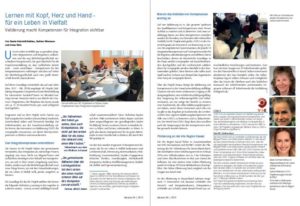 The German VIC partners DVV and BUPNET have released an article on the project in the German magazine dis.kurs – the magazine of the German Volkshochschulen (adult education centres)
The German VIC partners DVV and BUPNET have released an article on the project in the German magazine dis.kurs – the magazine of the German Volkshochschulen (adult education centres)
Please find the article on page 42 here.
Tag: integration
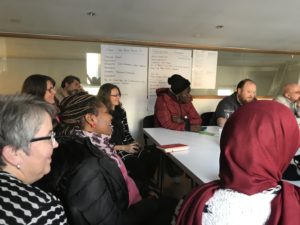 The third newsletter presents the blended learning programme consisting of national workshops in each partner country, e-learning modules, and the piloting phase. The e-learning course aims to introduce our concept and to support adult educators to plan, deliver and evaluate innovative integration learning activities and eventually to validate the integration competences developed in these learning offers. Please download the newsletter here.
The third newsletter presents the blended learning programme consisting of national workshops in each partner country, e-learning modules, and the piloting phase. The e-learning course aims to introduce our concept and to support adult educators to plan, deliver and evaluate innovative integration learning activities and eventually to validate the integration competences developed in these learning offers. Please download the newsletter here.
 The VIC blended learning course is now available. It consists of: national workshops in each partner country, e-learning modules, and piloting phase. The e-learning course aims to introduce our concept and to support adult educators to plan, deliver and evaluate innovative integration learning activities and eventually to validate the integration competences developed in these learning offers.
The VIC blended learning course is now available. It consists of: national workshops in each partner country, e-learning modules, and piloting phase. The e-learning course aims to introduce our concept and to support adult educators to plan, deliver and evaluate innovative integration learning activities and eventually to validate the integration competences developed in these learning offers.
The four learning modules provide a combination of theoretical input, learning activities and a variety of examples and practical tips on how to implement the VIC-approach in the daily work with your learners.
If you are interested to take part in the blended learning course, please don’t hesitate to contact one of the partner institutions
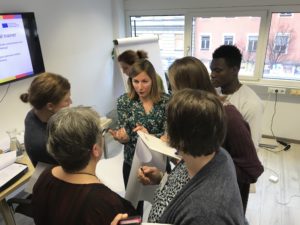 The German partners, DVV and BUPNET, were invited to provide a workshop in the framework of the conference entitled Angekommen in Deutschland – was nun? (please find the documentation in German here) organised by the German NA.
The German partners, DVV and BUPNET, were invited to provide a workshop in the framework of the conference entitled Angekommen in Deutschland – was nun? (please find the documentation in German here) organised by the German NA.
After a short introduction into the project, Sabine and Beater presented the concept of “integration” and the different competencies associated with it. The aim is to evaluate and visualise these competences using the LEVEL5 validation system. This has already been developed in various previous projects. The participants were given an overview of the LEVEL5 reference system and its application in the VIC project. Then all participants were given the task to firstly assess themselves in terms of their knowledge, skills and attitudes using the reference system for the competence “Intercultural Communication”. This self-assessment was then jointly evaluated and discussed – with the participants finally agreeing that a well-founded self-assessment is indeed difficult, but at the same time helpful and valuable.
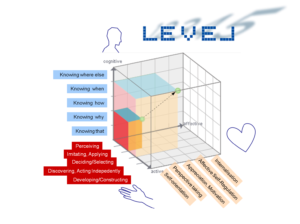 The second newsletter provides information on the validation system LEVEL that will be used in the context of the project. LEVEL5 will be one of the main elements of our VIC blended learning offer that will be available in autumn 2018.
The second newsletter provides information on the validation system LEVEL that will be used in the context of the project. LEVEL5 will be one of the main elements of our VIC blended learning offer that will be available in autumn 2018.
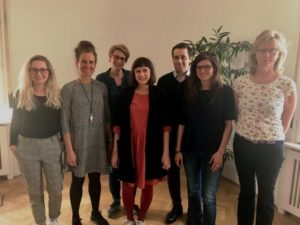 On 10./11. of April, the VIC partners met in Vienna and started developing the competence framework based on LEVEL5 for assessing and validating refugees’ competences related to the integration process.
On 10./11. of April, the VIC partners met in Vienna and started developing the competence framework based on LEVEL5 for assessing and validating refugees’ competences related to the integration process.
According to the idea that all citizens shall be equipped with a number of competences to be able to live peacefully together in a diverse society the VIC partners set up a repository of competences.
 VIC aims to validate integration competences of refugees and the impact of integration programmes.
VIC aims to validate integration competences of refugees and the impact of integration programmes.
In order to understand the scope of European integration activities for refugees across Europe the VIC partners firstly carried out a survey on existing integration programmes in different European member states.
The results show that most of these programmes relate to linguistic and certain formal citizenship topics. In many cases, there is neither a description of the objectives of the integration programme nor a clear description of the aspired competences within these courses. Therefore, it is very difficult to derive a common definition of what “integration” actually means in each of the courses.
The VIC Team is happy to release its first newsletter describing the initial activities in the project – such as finding a common definition of integration competence as basis for establishing a competence oriented learning and validation approach that can be implemented in integration and language courses for migrants and refugees.
Find out more here.

VIC will develop an approach to measure the effectiveness of the educational offers that have been put in place to ease immigrants’ pathways to integration, on the one hand, and to assess their impact on the individual integration competences of the immigrants, on the other hand. Hence the project is focusing on the validation of integration competences.
VIC will develop a validation system for this purpose which is based on the LEVEL5 approach. LEVEL5 is a unique system to validate competences and competence developments and to create learning environments and pathways in non-formal and informal learning contexts.
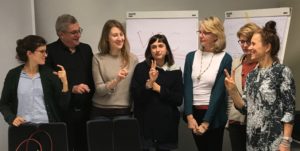 VIC has officially started in December 2017 with a first partner meeting in Bonn, Germany.
VIC has officially started in December 2017 with a first partner meeting in Bonn, Germany.
The two-day meeting served to get to know the project and the involved staff members and to plan in further detail the next steps. Currently, the partners are exploring existing integration programmes in their countries in order to destil from them an operational working definition of “integration competence” as basis for the development of the VIC validation approach.

